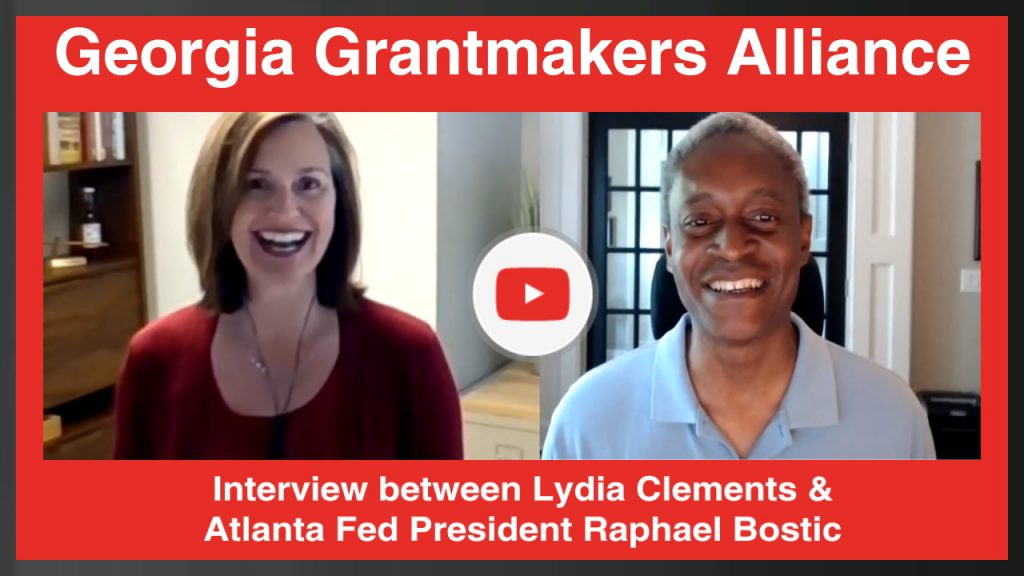Good Sunday Morning, and please take some time for a walk with your earbuds. We have for you a video call between Lydia Clements, director of the Georgia Grantmakers Alliance, and Raphael Bostic, president and chief executive officer of the Atlanta Fed: https://www.youtube.com/embed/EWIj8iNV6QU.
At the SECF website the Georgia Grantmakers Alliance (GGA) is described as “a nonpartisan group open to all private grantmakers, regardless of SECF membership” (https://www.secf.org/OUR-REGION/Geographic-Affinity-Groups/Georgia-Grantmakers-Alliance). The GGA forges, strengthens, and expands connections among private grantmakers in Georgia to explore issues, share learning, and promote sound public policy.
The video is an interview of Atlanta Fed President Raphael Bostic, covering the application of Federal Reserve policy combined with a very thoughtful and highly specific commentary about philanthropy. We strongly recommend it for anyone who is a donor, trustee, nonprofit employee, or charitable activist. Please note that Cumberland has clients in the charity space. We found this interview to be an hour well spent.
President Bostic analyzes in some detail the impact COVID-19 has had on lower-income communities and small businesses and outlines roles for philanthropic response. He notes the Atlanta Fed’s own response in providing liquidity “in a bold and aggressive way” including its paycheck protection liquidity facility program, its mainstream lending facility program, and its municipal liquidity facility program. Bostic notes the Atlanta Fed’s broader focus on fostering economic mobility and resilience, with an increased emphasis on resilience in light of economic impacts driven by the pandemic. Key to the post-pandemic recovery is urgently needed support that keeps parts of the economy from shutting down and keeps workers connected to their employers.
Please note the slides used by President Bostic, starting around minute 25. Note the rise in demands on charities that is occurring simultaneously with the fall in revenue.
The importance of nonprofits as we bridge the transition from COVID onslaught to post-vaccine recovery cannot be understated. Hat tip to GIC board member Stephanie Mackay for sending the link. We strongly encourage readers to listen to the entire conversation for Bostic’s analysis of the structural challenges for resilience and recovery and his vision for the roles that philanthropy can play by embracing opportunities for flexible, nimble response.
A final thought.
The words philanthropy and charity both have their roots in Greek. Here are links on the etymology of each word. Philanthropy: https://en.wikipedia.org/wiki/Philanthropy#Etymology. Charity: https://en.wikipedia.org/wiki/Charity_(practice)#Etymology. In today’s world, the words are used almost interchangeably, but in the course of human history we find nuanced differences. Nearly every religion teaches the importance of charity. Helping others in need reaches back at least as far as the origins of written human history. Charity has often been called for when disease has reared its head periodically throughout history. Here is a page on the bubonic plague that befell Athens in 430 BC, during the Peloponnesian War: https://www.ancient.eu/article/939/the-plague-at-athens-430-427-bce/. And here is a history lesson about the origins of philanthropy and how it has developed: “Philanthropy in ancient times: some early examples from the Mediterranean,” https://sofii.org/article/philanthropy-in-ancient-times-some-early-examples-from-the-mediterranean.
And now in 2020 we face this historic moment of plague and charitable response. What we do and how we do it will create the legacy of our times when it is revealed in the history written about us.
Have a happy and, I hope, a seriously thoughtful Sunday.
David R. Kotok
Chairman of the Board & Chief Investment Officer
Email | Bio
Links to other websites or electronic media controlled or offered by Third-Parties (non-affiliates of Cumberland Advisors) are provided only as a reference and courtesy to our users. Cumberland Advisors has no control over such websites, does not recommend or endorse any opinions, ideas, products, information, or content of such sites, and makes no warranties as to the accuracy, completeness, reliability or suitability of their content. Cumberland Advisors hereby disclaims liability for any information, materials, products or services posted or offered at any of the Third-Party websites. The Third-Party may have a privacy and/or security policy different from that of Cumberland Advisors. Therefore, please refer to the specific privacy and security policies of the Third-Party when accessing their websites.
Sign up for our FREE Cumberland Market Commentaries
Cumberland Advisors Market Commentaries offer insights and analysis on upcoming, important economic issues that potentially impact global financial markets. Our team shares their thinking on global economic developments, market news and other factors that often influence investment opportunities and strategies.






